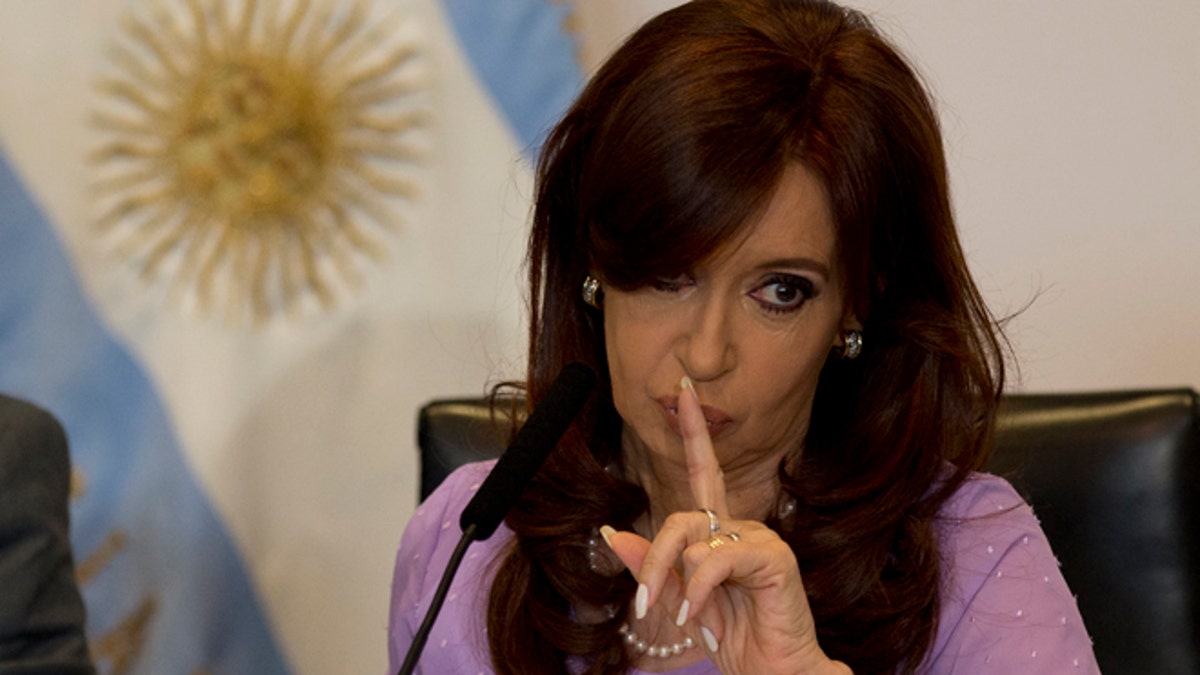
Argentina's President Cristina Fernandez signals to supporters during an event announcing new government projects at the government palace Casa Rosada, in Buenos Aires, Argentina, Wednesday, Feb. 11, 2015. (AP Photo/Rodrigo Abd)
Prosecutors in Argentina called late last week for a silent march in Buenos Aires to commemorate the one month anniversary of the death of Alberto Nisman, which made the already beleaguered government of President Cristina Fernández de Kirchner get nervous.
When it was announced that a number of the country's judges and opposition politicians would join the February 18 march, the government began its backlash.
While Fernández danced around the matter during a Wednesday press conference at the presidential palace, many in the government have openly voiced their skepticism at the "apolitical" nature of the march given the judges and opposition lawmakers who plan to be in the ranks heading to the Plaza de Mayo come next Wednesday.
"Many politicians are huge opportunists who want to use the Nisman march for their own benefit," Aníbal Fernández, Secretary General of the Presidency said, according to Notimérica.
Argentina will hold general elections this October and the majority of the contenders to replace the president – who has reached her maximum two consecutive terms in office – have confirmed their participation in next week's march, as well as members of Argentina's Jewish community – the largest in Latin America and the seventh-largest in the world.
Nisman was found shot to death in his bathroom on Jan. 18. The discovery came shortly before he was to appear in Congress to detail his allegations that Fernández de Kirchner helped Iran cover up its participation in the 1994 bombing of a Buenos Aires Jewish center, which killed 85. Fernández de Kirchner and Iran deny the accusations.
Despite the participation of some judges in the March of Silence, there also have been complaints within the judiciary – from the Justicia Legítima association, a group known as strong backers of Fernández de Kirchner.
"This is bullying," said Judge María Laura Garrigós, president of Justicia Legítima, to the newspaper Página/12. "This is not a legal discussion, or a discussion about possible ways of working. This is a purely political expression," she added, noting that the march "will show who is on which side."
She also questioned the integrity of the prosecutors calling for the protest: "They are no angels," she said and noted that some of them "are marked by their work record."
Many observers claim that the Fernández de Kirchner government's only comment was to criticize the politicians and judges participating in the march is a way to deflect the blame away from her and shift it toward her political opponents.
"It's a classic populist ploy to define the world in terms of us versus them," Cynthia Arnson, director of the Latin American program at the Woodrow Wilson International Center for Scholars, told Fox News Latino.
Despite the government criticism, organizers and supporters of the march have argued that the judges and prosecutors who take the streets – alongside politicians, union members and other Argentinians – have the right to march and that the country needs to figure out whether Nisman was murdered or committed suicide.
"There is widespread frustration in Argentina that the case will never be solved," Arnson said.
One of the most vocal detractors of the government's response has been Attorney General Ricardo Saenz, who lashed out at the government's criticism of the judges participating in the march.
"Those who cannot say what they think are those [judges] who have been pressured not to attend the march," Saenz said, according to the Buenos Aires daily, La Nación. "They can have their silence. They always liked the silence. Either because they have nothing to say or because they cannot speak their minds."
The death of Nisman has worried many people who work in the legal system of Argentina as the case appears to harken back to the 1970s and early 1980s when free speech in the Southern Cone nation was almost non-existent, and political murders were commonplace under the country's violent military dictatorship.
Speaking to Radio América, Germán Moulds, a prosecutor in Buenos Aires' Federal Court, said that many lawyers fear for their safety and that Argentina has become a very violent place for people in the legal profession.
"I lived in fear in the mid-70s, and I notice that in sectors of the population that fear is coming back," he said, referring to the bloodiest period of the country's military dictatorship.
Next week's march, observers says, is a reaction to the widespread distrust and unhappiness that many harbor toward the Fernández de Kirchner government and its handling of the Nisman case.
Many doubt the sincerity of Fernández de Kirchner's promise to find out what happened to Nisman the night of his death, especially given the information that came to light because of his investigation and the arrest orders for the president and her Foreign Minister, Héctor Timerman, which were found in Nisman's trash.
The Fernández de Kirchner administration, however, is notorious for attacking anyone who criticizes its actions – as evidenced by its long battle with a number of media organizations in the country which it accuses of promoting the overthrow of her government.
"This is a government that has never been very tolerant of criticism," Chris Sabatini, a professor of Latin American policy at Columbia University told FNL. "It's rather unseemly, however, to see an elected government attacking judges. It's a huge violation of the separation between the executive and the judiciary."
